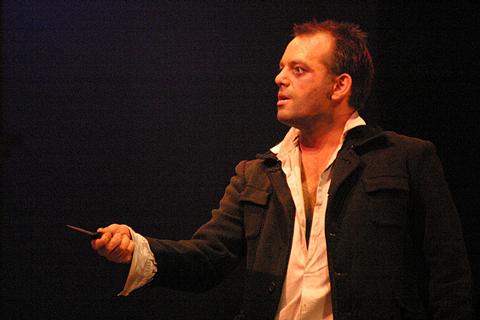|
<< -- 6 -- Roderic Dunnett A SUREFIRE HIT

Like several of the cast here, Stowe's Don José, Michael Bracegirdle, is an alumnus of Manchester's RNCM, best of all British Music Academies. Bracegirdle's Don José proved both an interesting and an annoying interpretation. For all the opening affability, this Don José seems a psychopath almost before he starts. No wonder by the end -- with slightly overgenerous larding by the make up department -- he enters like Jack the Ripper crossed with a drugged Dostoyevskian Raskolnikov : you wonder what he's on : absinthe? opium? He produces a rather unorthodox, insufficiently controlled, even unpleasant, barky sound at times -- though that didn't prevent him producing lots of passion (freeing her from the handcuffs) and one fabulously tuned passage in high register towards the end of Act I. If ever Stowe wants to mount Tchaikovsky's The Queen of Spades, it clearly has a ready-made Hermann on its doorstep.

Michael Bracegirdle, Stowe Opera's increasingly deranged, embattled and psychopathic Don José. Photo © 2004 John Credland
|
The problem is that this barking-mad, hollow-eyed Don José occasionally let his bark cross over into some of the tender bits, too. Bracegirdle does the whining and shrieking, the jealous and nasty squealing quite magnificently. As he is doubled by low strings in Act III, you feel the fate motif growing under the skin like an inscutable canker. Likewise the 'Adieu pour jamais', 'Oh! Je suis jaloux!' and 'Tu ne m'aime non plus' : each cut to the quick. But here and there the undue edginess informed other parts of José's recitative which didn't need this supercharging. At times, you felt -- pace his Manchester tutors -- the balance between chest sound and diaphragm-support wasn't quite right; and indeed, Bracegirdle came relatively late to the RNCM and to professional singing; to be fair, it's early days yet.
More happily, whenever he sang in close proximity with Fontane's Carmen, this problem eased: their duetting was a pleasure -- they offset each other effectively, and both their mutual balance and Secret's balancing of the orchestra in these passages worked to especially good effect.
Continue >>
Copyright © 3 October 2004
Roderic Dunnett, Mirfield, Yorkshire, UK

|

